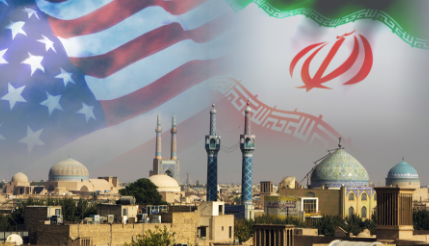(单词翻译:单击)
听力文本
Hari Sreenivasan: For more on the confrontation between Iran and the United States, we turn to Barbara Slavin, director of the Future of Iran Initiative at the Atlantic Council in Washington D.C. Thanks so much for joining us.
Barbara Slavin: Sure, my pleasure.
Hari Sreenivasan: So first, let me start out with, there's kind of two levels here. There's rhetoric and there's action and they both seem to be escalating.
Barbara Slavin: Yes, indeed. I think the action is the part that concerns me the most. I mean, we've had 40 years of exchanging insults between Iran and the United States. But this action is particularly worrisome. The events in the Persian Gulf seem to be heating up. Fortunately, there's been no loss of life. But of course something like this could always spiral out of control.
Hari Sreenivasan: You know the tankers that we saw that were in the news in the past couple of days, that overshadow the news that Prime Minister Abe from Japan was there trying to have kind of a diplomatic solution to this trying to be a bridge between the United States and Iran?
Barbara Slavin: Well you know one can still hope that some messages were passed. I think the Iranians probably told Prime Minister Abe that if the United States really wants new negotiations it's going to have to make some concessions to Iran; it cannot continue an embargo on all sales, all exports of Iranian oil. It's going to have to promise some concessions I think. And I'm not sure the Trump administration is prepared to do that, especially not after these incidents in the Persian Gulf.
Hari Sreenivasan: And at the same time now we see that the Iranians say, listen we are ramping up our ability to make nuclear weapons.
Barbara Slavin: First of all, the Iranians deny that that is their intention.
Hari Sreenivasan: Right.
Barbara Slavin: What they are doing is they are slowly beginning to increase the amounts of low enriched uranium, which they have. And at some point, yes, they may go above the limits that were set by the 2015 nuclear deal. But let's remember that the United States pulled out of that deal a year ago while Iran was in full compliance and has now put the most stringent sanctions on Iran in the history of the Islamic Republic of Iran. So I would say that what Iran is doing, at least in terms of its nuclear program, is much more calibrated in a way than what we're seeing in the Persian Gulf.
Hari Sreenivasan: After the US withdrawal from the agreement with Iran, what have the other signatories been doing in the past year?

Barbara Slavin: The others that participated in the negotiations have been trying to encourage Iran to stay in the agreement. But unfortunately, particularly in the case of the Europeans, they have not been able to find a way to continue to trade with Iran even on non sanction goods like food and medicine, that has not been threatened by U.S. sanctions. So the Iranians are very frustrated and frankly understandably so that they at least up until now had been observing this agreement and they're getting no economic benefits. And I think we're beginning to see this frustration boil over and unfortunately in ways that are rather reckless and dangerous.
Hari Sreenivasan: And how does the Iranian public perceive all of this?
Barbara Slavin: I think the Iranian public is just miserable. There were great hopes after this agreement was reached, that Iran's economy would really revive. They were experiencing economic growth. Businessmen were coming from all over the world looking into various ventures in Iran; people had great hopes. And then, first President Trump was elected with all the things he had to say about this agreement he didn't like it very much. And then, after you know threats and more threats finally he pulled out and reimposed sanctions. So in some ways people are more unhappy now than they've ever been because their expectations had been raised for a better life and those expectations have now been taken away.
Hari Sreenivasan: Barbara Slavin director of the Future of Iran initiative at the Atlantic Council in Washington D.C. Thanks so much for joining us.
Barbara Slavin: Thanks for having me.
重点解析
1. heat up 变激烈
Then in the last couple of years, the movement for democracy began to heat up.
然后在过去几年里,民主运动开始升温。
2.in terms of 就..而言
Bsically I think he would be someone who complemented me in terms of character.
我基本上认为他是在性格上和我互补的人。
3.pull out 退出
The militia in Lebanon has agreed to pull out of Beirut.
黎巴嫩的民兵组织已经同意从贝鲁特撤出。
4.spiral out of control 失控
Obviously, this is a situation set to spiral out of control.
很显然,这是一种失控的状态。
5.up until now 直到现在
See, up until now I have been talking about gas phase, single atoms, all this stuff.
看,只到现在我们已经讨论了气相,单原子,这些东西。
参考译文
哈里·斯瑞尼瓦桑:为了了解美伊冲突的更多消息,我们来连线芭芭拉·斯莱文。他是华盛顿大西洋理事会的伊朗未来倡议的负责人。感谢您来到我们的节目。
芭芭拉·斯莱文:谢谢,我很高兴能来。
哈里·斯瑞尼瓦桑:我想先从两个层级讲起。无论是言语还是行动方面,问题都在升级。
芭芭拉·斯莱文:是的,没错,我个人认为,行动方面是最让我担心的。毕竟过去40年来,美国和伊朗之间一直对彼此言辞犀利。但这次的行动尤其让人担忧。波斯湾事件似乎正在升级。幸运的是,没有死亡事件出现。不过,当然了,类似这样的事情经常会脱离控制。
哈里·斯瑞尼瓦桑:过去数天里,我们看到与油轮有关的新闻。这样的新闻受到的关注已经盖过了日本首相安倍晋三试图寻求为美伊寻找外交解决方案的新闻了。
芭芭拉·斯莱文:不过,美伊信息的传递还是有希望的。我认为,伊朗人很有可能对安倍晋三说:如果美国真地希望展开新一轮谈判,那么就要对伊朗做出让步;美国不能继续禁运伊朗的所有出口品以及出口的所有石油。我认为,美国必须要承诺些让步才行。我不确定特朗普政府是否愿意这样做,尤其是在波斯湾发生了这么多事儿之后。
哈里·斯瑞尼瓦桑:与此同时,现在,我们看到一些伊朗人表态说:听着,我们准备制造核武器了。
芭芭拉·斯莱文:首先,伊朗人否认自己想要制造核武器的念头。
哈里·斯瑞尼瓦桑:是这样的。
芭芭拉·斯莱文:他们现在在做的是——缓步开始提升低浓缩铀的总量,他们也确实这样做了。在某个节点上,他们可能真地会超越2015年伊朗核协议设定的上限。不过,不知大家是否还记得:美国1年前退出了该项协议。那时候,伊朗完全不顺从美国的意思。伊朗现在经受的美国制裁是伊朗历史上最严厉的时期。所以我认为,至少就核项目而言,伊朗现在所做的事情跟波斯湾发生的事情是挂钩的。
哈里·斯瑞尼瓦桑:美国退出伊朗核协议之后的这一年里,其他签约国有哪些举动呢?
芭芭拉·斯莱文:其他参加了谈判的签约国一直在鼓励伊朗不要退出该协议。不过,不幸的是,尤其是欧洲的一些签约国,它们找不到什么方法能与伊朗继续进行贸易,即便是没有受到制裁的商品也不例外,比如粮食和药品。这些商品都不受美国威胁。因此,伊朗感到十分沮丧,这也是人之常情,毕竟目前为止,伊朗都有遵守协议规定,但伊朗却没赚到一分一毫。我认为,我想这一锅浑水已经达到了沸点,其沸腾的方式是缺乏理性的,是危险的。
哈里·斯瑞尼瓦桑:那么,伊朗公众是如何看待这个问题的呢?
芭芭拉·斯莱文:我认为,伊朗公众都很痛苦。协议达成后,他们满心希望伊朗经济能够提振。而他们的期望确实也实现了。来自世界各地的商人都在寻找机会探索伊朗市场,人们都怀抱希望。后来,先是特朗普当选,而特朗普是极力反对伊朗核协议的。随后,在一次又一次的威胁后,特朗普终于退群了,还施加了制裁。所以,从某种方面来看,伊朗人民的心情现在是处于低谷的,因为他们原本期望更好的生活,但生活的希望被夺走了。
哈里·斯瑞尼瓦桑:让我们感谢华盛顿大西洋理事会伊朗未来倡议的负责人芭芭拉·斯莱文加入我们今晚的节目。
芭芭拉·斯莱文:感谢节目组邀请我。
译文为可可英语翻译,未经授权请勿转载!


